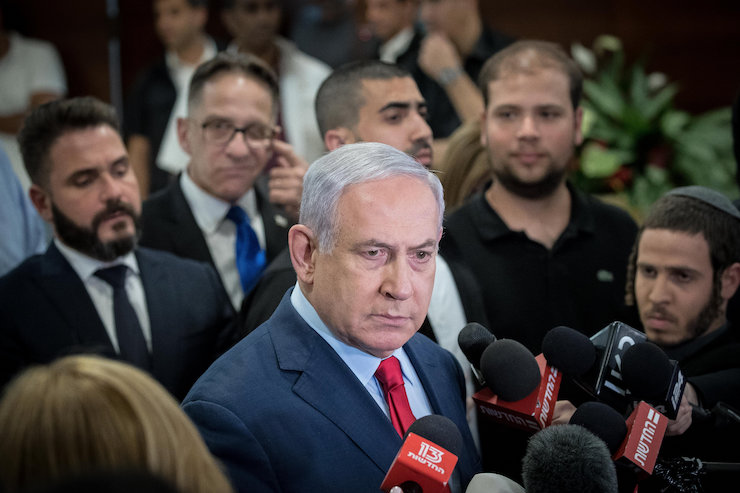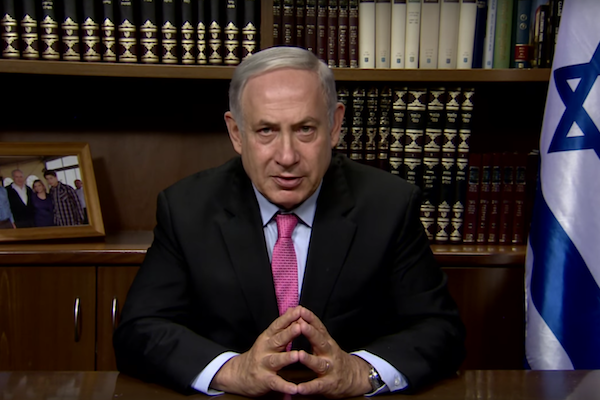Just one week out from the second national elections in six months, Prime Minister Netanyahu’s relationship with the Israeli media seems to be at an all-time low. But are his ferocious attacks on the press all they seem?

In the final stretches of Israel’s second election campaign in six months, Prime Minister Benjamin Netanyahu’s tried-and-tested tactic of attacking the media has once again been dominating the headlines.
The prime minister has long had an adversarial relationship with the national press, but he appears to have stepped up the vitriol in recent weeks. At the end of August, in a Facebook live video, he accused the Keshet Media Group of committing “a terror attack against democracy” for probing his corruption scandals through Channel 12 news. This came a day after he called for a boycott of the same company over its joint production of HBO’s “Our Boys,” which he blasted as “anti-Semitic,” also on Facebook. The reporter at the heart of Netanyahu’s accusations, Guy Peleg, has since been assigned a bodyguard.
Netanyahu again attacked Channel 12 earlier last week, labeling it a “leftist propaganda channel” in a Telegram message to his supporters, in which he also took a swipe at the much-revered Jewish National Fund for buying advertising space in the outlet. At the same time, the prime minister has been sowing false stories about the supposedly impending theft of the upcoming election through Palestinian voter fraud.
Fresh revelations have recently emerged about the extent of Netanyahu’s efforts to mold the Israeli media landscape in his image, following the leak of a conversation between himself and his successor as communications minister, Ayoub Kara. To cap it all, Netanyahu’s various trials on corruption charges — including two involving his attempts to manipulate media coverage of himself and his family — are edging ever-closer.
But is Netanyahu’s scorched earth campaign really all that it seems? Does the media play a role in fanning the flames? And is the trend of global authoritarianism having an impact on the media landscape in Israel-Palestine? In order to dig into these questions and more, +972 Magazine spoke with Shuki Tausig, editor of the Israeli media watchdog The Seventh Eye.
This conversation has been edited for length and clarity.
In this final stretch of the current election campaign, Netanyahu’s attacks on the media seem to have moved up a gear. What’s caused these latest outbursts?
“There’s actually nothing new on this front. Netanyahu has been using the media as a target since his first candidacy for prime minister in the 1990s. One of his most famous quotes came more than 20 years ago, when he chanted ‘They. Are. Afraid!’ to a crowd of Likud supporters at a campaign event [in 1999, when he accused the left of conspiring with the media to defeat him]. Any populist leader who operates on fear and hate needs to find a target or agent for that fear and hate. For Netanyahu, the media was the candidate from the start, and in the last few years has been joined by Israeli Arabs, or Israeli-Palestinians.
“The attacks have been escalating recently, but that’s because of the medium more than the content. If 20 years ago Netanyahu needed to shout at campaign rallies, and 10 years ago he needed to court journalists to interview him, now he has his own microphone with Facebook, where he can say anything he wants without limitations. There are laws restricting propaganda in an election period, but these don’t apply online — only in the traditional media. It’s the same way Trump and other populist leaders around the world manipulate social media.
“But Netanyahu also has a unique campaign method — he uses his son, Yair, as a proxy. Yair has his own social media accounts, and Netanyahu uses them as a testing ground. A lot of the more aggressive and poisonous remarks you see Netanyahu publishing on social media were first tested on Yair’s accounts. Yair publishes the comments, they see how the public and the media react to it, and then they decide whether to bring it up to [Netanyahu’s] level.”
So you’re saying that what we’ve been seeing in the last few weeks and months is less Netanyahu changing, and more that we’re just seeing him unfiltered?
“Right. It’s a change in style, not in content, and a change in quantity, rather than quality. But of course, when you change quantity, the quality also changes. When you become more and more aggressive, it becomes a whole new game.”
Has anything at all changed over the last few elections?
“In the last three or four election campaigns, the recurring motif has been the use of Arabs and journalists as a scapegoat — for example, his famous video from election day in 2015, in which he said that left-wingers are bussing Arabs to the polls. The same messages are being repeated now: ‘The Arabs are stealing the election,’ ‘they’re falsifying the polls,’ etc., alongside attacks on the media.
“The thing Netanyahu is changing is the tone. You can see the difference between him and previous prime ministers, and also between him now and him five or 10 years ago. He’s become more and more aggressive and paranoid. And that’s because a lot of norms and working assumptions that we used to have are now divided across a left-right agenda.
“Five, 10, or 20 years ago, things like the desire for peace, coexistence between Israeli Arabs and Israeli Jews, and respect for basic rights were considered common interests across the political spectrum, even if they disagreed on how to achieve it. Now, they’re divided, and it’s Netanyahu who’s pushing the envelope on this, but he’s doing it through deceit and lies. He’s not waving a flag and saying, ‘let’s all be racists, kill all the Arabs, hang all the journalists.’ Instead, he’s using implication and innuendo to send the same message.
“This works for him: if you look at the Noam party, which is very open about saying, ‘We think homosexuals are not normal, we want to ban them,’ they’re not doing well, because most people don’t like hearing that. But Bibi says what’s good for him politically at any given moment, and it’s confusing. That’s what’s causing the deterioration. And there have always been racists and fascists, but high-ranking politicians never spoke like Netanyahu does now.
“Netanyahu has brought us into this age. But it might have happened without him, because you see it happening in the U.S., in Europe, and all over the world. So, if it wasn’t Netanyahu, perhaps someone else would have got us here.”
You mentioned Trump, and current global trends. Do you think the global rise in authoritarianism is playing a role here?
“Of course it’s related — Netanyahu is learning from Trump and Trump is learning from Netanyahu, and they’re both learning from the experiences of Eastern European populist leaders and dictators, and African dictators. It’s not a secret, because they’re all using the same advisors: George Birnbaum, Aron Shaviv, the late Arthur Finkelstein, etc.”
All three advisors Tausig mentions have counseled Netanyahu. Birnbaum has also advised Viktor Orbán and Ben Carson. Shaviv has advised numerous right-wing leaders in Central and Eastern Europe. Finkelstein advised Orbán, Strom Thurmond, and many other right-wing leaders across a 50-year career.

“The same people are running from dictator to dictator and populist leader to populist leader,” adds Tausig. “So, of course there is a connection. However, none of these politicians have invented anything. Netanyahu didn’t invent using the media as a scapegoat, nor did Trump. Just look at the relationship between Nixon and the media, for example. But any great leader, for good or for bad, will add their own touch. And Bibi is adding his unique touch of hatred and aggression, and making his mark on the propaganda world.”
In the wake of the latest allegations about Netanyahu’s efforts to manipulate the media, can you summarize the list of outlets the prime minister has tried to influence in one way or another, and how?
“It’s impossible to summarize, because Netanyahu has been involved in so many efforts to intervene in the media, from the radio to the internet, as a minister and as a prime minister. It’s a book. He’s constantly active, even when he’s legally barred from interfering.”
Thinking historically, is there a precedent for such a negative relationship between an Israeli prime minister and the Israeli media?
“Political leaders in Israel hating the media and attacking journalists is nothing new. [David] Ben-Gurion hated a famous paper called HaOlam HaZeh. He attacked it viciously and wouldn’t even mention it by name. He also recruited the Israeli secret service to establish a rival paper to undermine the publication. And according to HaOlam HaZeh editor Uri Avneri, Ben-Gurion also sent the secret service to burn the offices of the paper.
“So, Netanyahu is not the first prime minister to attack the media. [Ariel] Sharon hated a lot of journalists, he sued them. [Ehud] Olmert called journalists working for the [Jerusalem-based weekly] Kol Ha’Ir ‘vampires.’ So, we have to put everything in proportion. Netanyahu is not a villain among angels. The Israeli public arena is full of hatred.”
In that case, is the bad blood between Netanyahu and the Israeli media a chicken-and-egg scenario, or is one side more responsible than the other?
“First of all, there’s a lot of fakeness in this relationship. Netanyahu is in constant contact with many journalists, including those he regularly attacks. So, the picture presented by the media from one side and Netanyahu from the other side is the wrong one. Dealing with journalists takes up a large part of Netanyahu’s day — talking with them, briefing them. When he wants to be interviewed, he goes to the TV station and gets an interview.

“It’s convenient for Netanyahu to talk to his base about a war of annihilation between himself and the media, but it’s not the case. He works hand-in-hand with a lot of publishers and journalists. And a lot of journalists and media outlets also benefit from this image of being at war with Netanyahu. It’s the same thing as Trump being the best present the Washington Post could get. Media outlets benefit from being depicted as martyrs. So, they shoot at each other, and then get coffee together and it’s business as usual.”
How would you assess the damage Netanyahu’s done to the country’s media landscape? Can it be reversed, once the long-speculated ‘day after Netanyahu’ arrives?
“Actually, Netanyahu hasn’t done that much damage to the media landscape. He’s tried, but the media is so internally corrupt that some of his biggest efforts to undermine it actually helped the public interest, because he demolished — or at least weakened — a lot of corrupt outlets and journalists. The problems with the Israeli media didn’t start or end with Benjamin Netanyahu, and he will only be a footnote in the history of Israeli media corruption. Noni Mozes [the publisher of the Yedioth Ahronoth daily, involved in one of the corruption cases Netanyahu is also implicated in] did a lot more to corrupt the media than Netanyahu.
“It’s easy for the Israeli left to forget how things were before Netanyahu, but the main problem with the Israeli media is not Netanyahu, or the right, or racism, even though these are all big problems. The problem, rather, is that journalists and media all across the spectrum are working for their owners and their owners’ interests, and for commercial and political interests, rather than for the public.
“The names can vary. Today it’s Netanyahu, yesterday it was Sharon, and tomorrow it will be someone else. But this is the most important thing I have to say about it — populist leaders like Trump and Bibi couldn’t stoke so much hatred and fear toward minorities and the media if the media itself was working in the public interest. If the public thought that the media was working for them, Bibi wouldn’t succeed [in his attacks]. You can’t convince the public to hate something they love; you can only convince them to keep hating something they already hate.”


